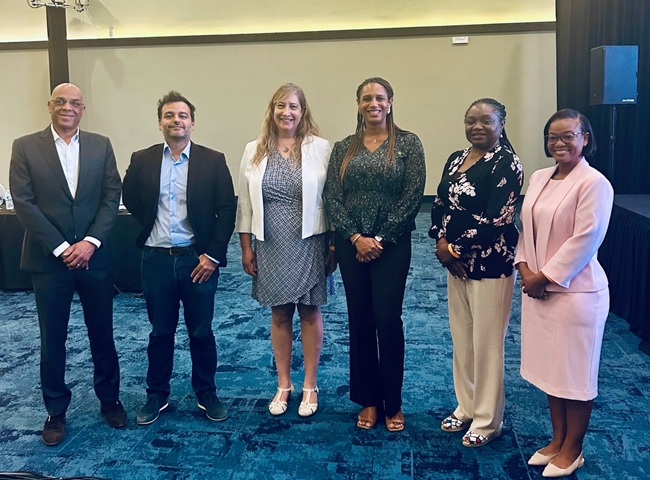Philipsburg, Sint Maarten – The Minister of Tourism, Economic Affairs, Transport and Telecommunication (TEATT) has commended the success of the Enterprise Support Project (ESP), describing it as a proven and effective model for small business development in Sint Maarten. She also expressed her intention to see the approach adopted locally and sustained beyond the life of the project.
During the 2025 Country Portfolio Performance Review (CPPR), organized by the World Bank, the Minister received a detailed presentation from the National Recovery Program Bureau (NRPB) outlining the ESP’s achievements to date and strategic priorities moving forward. The CPPR serves as an annual platform to assess the progress, challenges, and opportunities of all Trust Fund-financed projects in Sint Maarten.
Launched in 2019 and extended through 2028, the ESP was designed to support the recovery and long-term resilience of micro, small, and medium-sized enterprises (MSMEs) in the aftermath of Hurricane Irma. To date, the project has disbursed over USD 19.8 million in financial support to 291 businesses, including USD 7 million allocated specifically to women entrepreneurs. Support has included funding for repairs, asset acquisition, and working capital, enabling MSMEs to stabilize, rebuild, and grow.
In her remarks, the Minister expressed sincere gratitude to the World Bank and the NRPB for their role in delivering a high-impact program. “The Enterprise Support Project has not only empowered nearly 300 local businesses—it has laid the foundation for a more resilient MSME ecosystem,” she stated. “This is a model that has proven effective, and it is one we are committed to continuing independently once the ESP concludes.”
She emphasized the importance of carrying the ESP approach forward through strengthened local partnerships and institutional support. Continued training, business coaching, and improved access to finance were identified as critical pillars of future MSME development. The Minister also underscored the value of ongoing collaboration with institutions such as the Chamber of Commerce and commercial banks, noting, “Initial support is essential for small businesses to grow. We intend to build on this foundation to ensure our entrepreneurs continue to succeed.”
The Minister further commended Windward Islands Bank for establishing a dedicated small business loans department—an initiative she described as a significant step in meeting the financial needs of MSMEs. She encouraged other financial institutions to follow suit and contribute to the creation of a more inclusive and supportive financial ecosystem.
Since its inception, the ESP has delivered wide-reaching benefits across key sectors of the economy, including transportation, retail, and business services. More than 250 entrepreneurs have participated in training through the Small Business Academy and the Sint Maarten Entrepreneurship Development Center (SEDC). In 2024, the project launched a business coaching program aimed specifically at supporting micro and newly established businesses. The program has received overwhelmingly positive feedback, with a 91 percent satisfaction rate reported among beneficiaries.
The World Bank currently rates the ESP as “Satisfactory,” with the majority of project development objectives achieving between 83 and 100 percent of their targets. With the application period officially closed as of February 7, 2025, the project is now entering a new implementation phase. The focus will shift toward continued capacity building, including the expansion of training and coaching, the launch of a jobs survey to assess employment outcomes, and a portfolio review to evaluate the resilience and sustainability of supported enterprises.
Looking ahead, the Ministry of TEATT will continue to collaborate with the NRPB and the World Bank to ensure the effective disbursement of remaining project funds. The Minister also emphasized the need to institutionalize key components of the ESP to ensure that MSME support remains in place long after the conclusion of the project.
“We have seen that this model works,” the Minister concluded. “Now is the time to strengthen it further—through ongoing engagement with banks, support agencies, and government—so that we can continue to empower our entrepreneurs and reinforce the long-term resilience of Sint Maarten’s economy.”





























